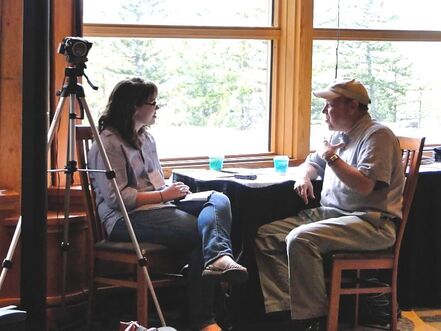Climate Stories Ambassadors
Are you excited about building the climate storytelling movement? Climate Stories Project is seeking Climate Stories Ambassadors to carry out interviews and share climate stories from communities around the world.

One of the greatest barriers to an effective and inclusive climate change movement is the lack of everyday conversations between community members about the climate crisis, including observations of change, engagement with emotional responses, and envisioning positive ways forward. As a Climate Stories Ambassador, you'll receive training, structure, and guidance to communicate with others in your community about their personal responses to the changing climate.
Here's what you'll do as a Climate Stories Ambassador:
Here's what you'll do as a Climate Stories Ambassador:
- Take part in three online training sessions.
- Learn about climate storytelling and record your own climate story.
- Receive training and guidance to conduct climate story interviews, and record 1-3 interviews.
- Connect with other Climate Stories Ambassadors from around the world.
- Learn valuable environmental communication skills.
- Promote an inclusive and effective movement to confront the climate crisis.
- Receive a certificate of completion of Climate Stories Ambassadors initiative for sharing your own climate story and at least one climate story interview.

The Climate Stories Ambassadors initiative is open to anyone from all ages and walks of life. You'll come away with a deeper connection to climate change as a vital personal and community issue, and make local, national, and international connections with people passionate about the climate storytelling movement.
The Climate Stories Ambassadors initiative can also be adapted for classroom or organizational use. There is no fee for participation, but registration is required.
The Climate Stories Ambassadors initiative can also be adapted for classroom or organizational use. There is no fee for participation, but registration is required.
Here are some useful documents to help you conduct climate story interviews:
Stories and interviews from our Spring 2024 Climate Stories Ambassadors cohort:
|
|
Listen to excerpts from an interview conducted by Climate Stories Ambassador, Amna Javed. Amna interviewed Habiba Burki, an undergratuate student in Lahore, Pakistan. Habiba discusses her thoughts and emotional responses about climate change.
|
|
|
Kudakwashe Pembere, from Harare, Zimbabwe, was interviewed by Climate Story Ambassador Blessing Bonga. In this interview excerpt, Kudakwashe discusses how the area around a local dam, which was once a place for fishing and relaxing by the water, has completely dried up due to climate change.
|
|
|
|
|
Edwin Koga is Director of the Amazon Theatrix Ensemble (A.T.E), based in Kisumu, Kenya. A.T.E. is a youth led theater organization offering an artistic platform for the use of "Storytelling for Change" in climate justice. View one of their performances about wetland conservation on YouTube.
|
|
Stories and interviews from our Fall 2023 Climate Stories Ambassadors:
|
|
Arzina Lakhani grew up in Hyderabad, India and immigrated to the US as a child. Climate Stories Ambassador, Maya Levine, interviewed Arzina about her thoughts and feelings on climate change in both the US and India. Arzina offered unique perspectives about the differences in experiences of the climate crisis between the Global North and the Global South. Listen to select excerpts from Arzina's interview below.
|
|
|
Listen to part of an interview with Hajra Hassan, by Climate Stories Ambassador, Shiza Ali. In this excerpt, Hajra discusses her thoughts and feelings about climate change.
|
|
|
In this excerpt from an interview by Climate Stories Project Ambassador Kate Trudeau, wildlife biologist, Milo Burcham, describes his experience ice skating among icebergs on a glacial lake and how the experience is changing due to the shrinking glacier.
|
Here are some interviews and stories from previous Climate Stories Ambassadors:
|
|
|